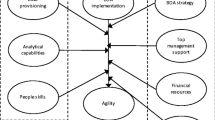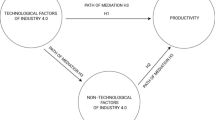Abstract
The purpose of this paper is to analyse if and to what extent the relation between implementing new technologies and organizational practices has a direct moderating effect on operational performance. Regression analysis technique was performed using data corresponding to the Spanish sub-sample of the European Manufacturing Survey (EMS) 2015 edition containing the responses of 101 manufacturing firms. The results present a positive relation between implementing organizational practices and operational performance. Implementing technologies individually has a negative effect on firm performance, but when this is mediated with organizational practices the effect becomes positive. The present study also brings implications in the direction of separate and joint effect of the impact of digitalisation and organisational practices on operational performance. The value of this research lies in its contributing novel, original data about the importance of applying flexibility enhancing technologies and organizational concepts.

Similar content being viewed by others
References
Bask A, Lipponen M, Rajahonka M, Tinnilä M (2010) The concept of modularity: diffusion from manufacturing to service production. J Manuf Technol Manag 21(3):355–375
Bayou M, Korvin A (2008) Measuring the leanness of manufacturing systems—a case study of Ford Motor Company and General Motors. J Eng Tech Manage 25(4):287–304
Belekoukias I, Garza-Reyes J, Kumar V (2014) The impact of lean methods and tools on the operational performance of manufacturing organisations. Int J Prod Res 52(18):5346–5366
Bhasin S (2012) Prominent obstacles to lean. Int J Prod Perform Manag 61(4):403–425
Bondarouk T, Ruel H (2008) HRM systems for successful information technology implementation: evidence from three case studies. Eur Manag J 26:153–165
Challis D, Samson D, Lawson B (2005) Impact of technological, organizational and human resource investments on employee and manufacturing performance: Australian and New Zealand evidence. Int J Prod Res 43(1):81–107
Dabhilkar M, Åhlström P (2013) Converging production models: the STS versus lean production debate revisited. Int J Oper Prod Manag 33(8):1019–1039
Das A, Jayaram J (2007) Socio-technical perspective on manufacturing system synergies. Int J Prod Res 45(1):169–205
Emery F, Trist E (1960) Socio-technical systems. In: Management sciences models and techniques, vol 2
Evangelista R, Vezzani A (2010) The economic impact of technological and organizational innovations. A firm-level analysis. Res Policy 39:1253–1263
Haartman R, Bengtsson L, Niss C (2016) Lean practices as requisites for the use of digital technology in production technology in production. In: 23rd EurOMA conference, Trondheim
Hadid S, Mansouri A, Gallear D (2016) Is lean service promising? A socio-technical perspective. Int J Oper Prod Manag 36(6):618–642
Hormozi A (2001) Agile manufacturing: the next logical step. Benchmarking Int J 8(2):132–143
ISI (2017) Fraunhofer (ISI). [En línea] http://www.isi.fraunhofer.de/isi-en/i/projekte/fems.php. Último acceso: Marzo 2017
Johnston D, Wade M, McClean R (2007) Does e-business matter to SMEs? A comparison of financial impacts of internet business solutions on European and North American SMEs. J Small Bus Manage 45(3):345–361
Kafetzopoulos D, Psomas E, Pantouvakis A (2013) The impact of ISO 9001 effectiveness on the performance of service companies. Manag Serv Qual Int J 23(2):149–164
Kim Y, Kumar V, Kumar U (2012) Relationship between quality management practices and innovation. J Oper Manag 30(4):295–315
Li Y, Zhao Y, Liu Y (2006) The relationship between HRM, technology innovation and performance in China. Int J Manpow 27(7):679–697
Lichtblau K (2015) Industrie 4.0 readiness. Cologne Institute for Economic Research, Denmark
Medić N, Anišić Z, Tešić S (2017) Survey of some key concepts of industry 4.0 in manufacturing companies from developing country. 4th International conference and workshop mechatronics in practice and education
Moyano-Fuentes M, Sacristán-Díaz P, Martínez‐Jurado PJ (2012) Cooperation in the supply chain and lean production adoption: evidence from the Spanish automotive industry. Int J Oper Prod Manag 32(9):1075–1096
Oswal N, Narayanappa G (2015) Evolution of HRM to E-HRM to achieve organizational effectiveness and sustainability. Int J Bus Adm Manag Res 1(2):22–26
Palcic I, Koren R, Buchmeister B (2014) Technical and organizational innovation in Slovenia manufacturing companies. In: Katalinic B (ed) DAAAM international scientific book. DAAAM International, Vienna, pp 19–32
Pekkarinen S, Ulkiniemi P (2008) Modularity in developing business services by platform approach. Int J Logist Manag 19(1):84–103
Rahman S, Laosirihongthong T, Sohal A (2010) Impact of lean strategy on operational performance: a study of Thai manufacturing companies. J Manufact Technol Manage 21(7):839–852
Riezebos J, Klingenberg W, Hicks C (2009) Lean production and information technology: Connection or contradiction? Comput Ind 60(4):237–247
Rocha-Lona L, Garza-Reyes J, Kumar V (2013) Building quality management systems: selecting the right methods and tools. Productivity Press, Boca Raton
Schallmo D, Williams C, Boardman L (2017) Digital transformation of business models—best practice, enablers, and roadmap. Int J Innov Manag 21(8):1740014-1-1740014–17
Zhanga D, Lindermanb K, Schroeder R (2012) The moderating role of contextual factors on quality management practices. J Oper Manag 30:12–23
Westerman G, Calméjane C, Bonnet D, Ferraris P, McAfee A (2011) Digital transformation: a roadmap for billion-dollar organizations. MIT Center for Digital Business and Capgemini Consulting, pp 1–68
Acknowledgements
The authors are grateful for the financial support from the University of Girona (Spain) MPCUdG2016/093.
Author information
Authors and Affiliations
Corresponding author
Additional information
Publisher's Note
Springer Nature remains neutral with regard to jurisdictional claims in published maps and institutional affiliations.
Rights and permissions
About this article
Cite this article
Manresa, A., Bikfalvi, A. & Simon, A. Investigating the impact of new technologies and organizational practices on operational performance: evidence from Spanish manufacturing companies. Cent Eur J Oper Res 29, 1317–1327 (2021). https://doi.org/10.1007/s10100-020-00692-8
Received:
Accepted:
Published:
Issue Date:
DOI: https://doi.org/10.1007/s10100-020-00692-8




